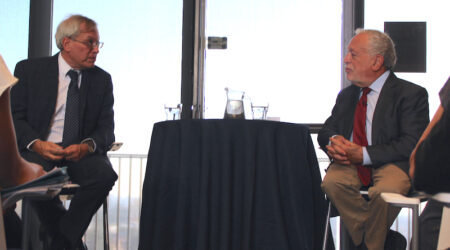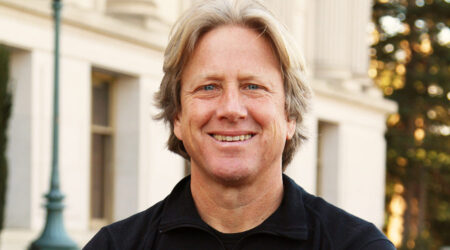On November 18, a “Matrix On Point” panel examined a recent report by the Intergovernmental Panel on Climate Change (IPCC), the United Nations body responsible for assessing the science related to climate change. The Special Report on the Ocean and Cryosphere in a Changing Climate paints a dire picture about the state of our planet’s ecological health, and calls for “ambitious and effective adaptation for sustainable development.”
The panel featured Daniel Kammen, Chair of the Energy and Resources Group at UC Berkeley; James Bishop, Professor in the Department of Earth and Planetary Science; Kathryn De Master, Assistant Professor of Agriculture, Society, and Environment in the Department of Environmental Science, Policy, and Management (ESPM); and Alexander Arroyo, PhD Student in the Department of Geography. Matrix On Point panels are designed to “draw upon the extraordinary range of expertise on these issues that we have on the Berkeley campus,” said Michael Watts, Interim Director of Matrix, in his opening remarks.
The discussion began with an overview by Daniel Kammen, who has served as a contributing or coordinating lead author on various IPCC reports since 1999. (Kammen was among the scientists who, as part of the IPCC, shared the 2007 Nobel Peace Prize.) He provided an overview of how the IPCC’s reports have evolved over the past two decades as scientific consensus about the potential threats and impacts of climate change has grown. (Slides from Kammen’s presentation can be found here.)
In the first IPCC report, Kammen said, “the strongest statement that we could collectively say…was that unequivocal detection of climate change is not likely for a decade.” The second report concluded there was “discernible human influence” on climate change. And a subsequent report concluded that “warming is 90% likely due to humans” and that “warming will most strongly impact the global poor.” For this third report, Kammen noted that he helped produce a special report on renewable energy that showed how an 80% clean energy economy could be possible. “Philosophically, this was a transition point, in terms of actually baking in a list of what we could do,” he said.
Kammen explained that there has been little progress since the 2015 Paris Climate Conference, which sought to keep the rise of global temperatures below two degrees Celsius above pre-industrial levels, and to pursue efforts to limit the increase to 1.5 degrees. “The brilliance of the 1.5 degree report is that it highlights very clearly, sector by sector, how much of a difference to the planet it will make to meet the one and a half degree target as opposed to the two,” Kammen said.
But he noted that achieving the 1.5-degree limit “basically means doubling down on everything we know how to do well—energy efficiency, renewables—and also to do things we don’t do well—or we don’t do it all—like finding ways to price pollution and be much more aggressive, not just to invest in clean energy, but also to protect forests and wetlands and fragile ocean systems.”
“The progress has been exceedingly slow,” Kammen said. “Only one country is on pace to make its target…. Many very solid scientists and economists and engineers think even two degrees… is impossible because we’re not on path for it,” Kammen said. “We’ve already warmed by between one degree and 1.1 degrees, so there’s not a lot of head room left…. We need buy-in among decision makers. Meaningful industry participation has been absent. And of course, without that, government participation has been largely absent.”
Next to speak was James Bishop, who provided an overview of some of the impacts of climate change on the ocean, including the potential impacts on fisheries and marine and land productivity. Bishop explained that he studies the role of “fish poop” in capturing carbon. (Slides from Bishop’s presentation can be found here.)
“Ocean pH is going down everywhere and sea level is rising everywhere,” he explained. “And then there are the ecosystem impacts. The prospect from this report is quite bleak. Why is this a crisis? We are actually running out of time to do something in a meaningful way. When I started this in the 1970s, everyone was saying, well, global warming. But this is global crisis. The social science impacts are huge because a lot of communities live at sea level. And even if you go up to 1.5 degrees and stabilize the recovery of the ocean to preindustrial CO2 levels, it will take thousands of years to recover, because that’s the time scale of the overturning circulation of the ocean.”
“That’s the wake up call,” Bishop said. “We’ve changed the circulation of the ocean, the return of nutrients to the surface, and that’s going to feed back into ocean productivity and fisheries.”
Drawing on her expertise in the sociology of agriculture and food production, Kathryn De Master focused on possible levers of change that could help reduce the impacts of climate change. She noted that “it’s a very complicated problem that requires some really nuanced solutions,” particularly as a change in one area—e.g. people deciding to reduce their milk and meat consumption—can have other impacts, such as dairy farmers choosing to use their land for fracking or other industrial production.
“One thing I think the IPCC gets right is that they notice that equity is a critical part of actually solving the climate change puzzle,” she said. “And if we’re attending to some of the social problems like equity, like people’s livelihoods, then some of the scientific questions may in fact get a little easier.
The final presentation came from Alexander Arroyo, who described himself as a “critical geographer with a background in environmental planning and landscape architecture,” with a specific interest in the “digital ocean,” which he explained is “a slew of technologies that are being developed to sense, map, and model what’s happening in the ocean.”
“I’m really interested in [the IPCC report] as a kind of geographical story,” Arroyo said. “What is really being shown here? How do we analyze these changes? Clearly they’re temporal, they’re spatial, but they’re also relational.”
Arroyo provided an overview of potential impacts of shifting coastlines and ice caps, including how fishermen and other groups may realign themselves. “What kind of new solidarities does this enable?” Arroyo asked. “Thinking from the ocean actually allows you to enter into new spaces of solidarity and then figure out how that hits the land, how that hits very specific conditions, contexts, and communities. So rather than this being a kind of think globally act locally issue, this is actually thinking in a really deeply interconnected but specific way.”
The presentations were followed by a lively audience Q&A. For information about other upcoming Matrix On Point events, please see https://matrix.berkeley.edu/events.
Slides from Daniel Kammen’s Presentation
Slides from James Bishop’s Presentation



